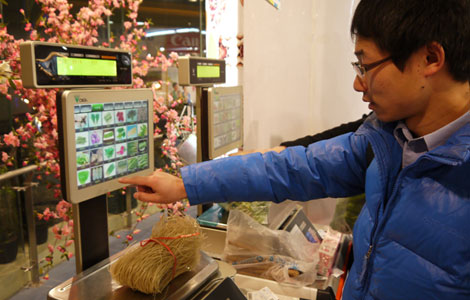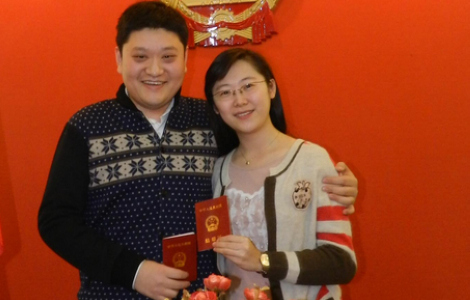
|
Virginie Fournier arrived in China 17 years ago with high expectations. "For me it was like Alibaba's cave," she says. Provided to China Daily |
Inspired by her travels, a French fashion designer brings her sense of style to Shanghai and Beijing
When Virginie Fournier first saw Chinese silk brought to Lyon, France, by her grandfather decades ago, she could not help but marvel. Now, after more than a decade spent living in China, the founder and creative director of Shanghai Trio, a fashion brand, is still inspired by the country. "When I'm in China, I see beautiful things everywhere," she says.
Be it delicate silk or rough work jackets, Fournier knows how to resurrect traditional Chinese materials and crafts by adding a modern twist.
Displays in the Beijing store - it also has two stores in Shanghai - include a children's silk quilted jacket, a hand-woven cotton dress and 1980s-style printed cotton sheets, which give the place the feel of a museum of vanishing Chinese handicrafts.
Apart from clothes and fashion accessories, the chain also sells houseware. Prices range from 80 yuan ($12.80; 10 euros) to tens of thousands of yuan.
"I really want to create a brand that is born in Shanghai, but it shouldn't be ethnic," Fournier says. "It should be modern."
"I want us to find the roots of China and use them. The purpose is to be neither trendy nor traditional, but modern."
While Fournier stays faithful to traditions, she is not afraid to employ new elements, and China's bustling streets have been a constant inspiration for her.
Three years ago Fournier used the neon orange that is now fashionable, inspired by people she saw on the street.
"It can be workers or travelers, immigrants or fashionable people. Why not mix it with silk and leather?"
Shanghai Trio's orange raincoat has been one of its best sellers.
The building industry has also been a source of ideas for Fournier. With moderations, an electrician's bag turns into a chic haversack.
Born and raised in Lyon, a city renowned for beautiful fabrics, Fournier's keen eyes and refined tastes are innate. She also owes her fashion sense to her upbringing.
"This is really about education. It's not something I developed by myself. I was brought up by people who loved seeing the arts. It doesn't have to be expensive or luxury, but something nice. The childhood and teenage years are really important, because they feed your adult life," she says.
Trained as a historian, Fournier had no clear idea about what she was going to do when she first came to Shanghai with her husband in 1995.
All she knew was, "I wished to find beautiful things. For me, China was like Ali Baba's cave. It was certain that I could find beautiful things, but it was hard to do."
Initially Fournier began to look at Chinese craftsmanship and materials such as silk, embroidery and bamboo. Then she began to search for suppliers. She opened her first store in Xintiandi, a trendy shopping area of Shanghai, in 1998, when independent brands were scarce and there was little demand for them.
"Around the year 2000 there were not many small brands coming out. People were used to big investments. People were like, 'Who are you, where do you come from?' It was a huge challenge to order raw materials of good quality and small quantity. We felt like we were small. But now we are like, 'No, we are client.' Now we beg less and we have to fight against ourselves."
Fournier moved back to Paris with her family in 2005 and then on to London in 2007. Each city has inspired her in a different way.
"Beijing and London are similar because people really try, they can be crazy. Last year here I saw girls in Beijing wearing very funny shoes. But in Shanghai you don't see this kind of thing. They are elegant and chic. It's the same in Paris.
"In London, you don't see two people looking the same. When I arrived in London, I said, 'Wow, this is good,' because they know how to mix everything: the old, the new, and the colors. They are not afraid."
Now Fournier visits China every three months and manages her Chinese team via Skype. Although she no longer lives in China, she still finds ways to experience the country's culture.
"It's a paradox. For example, I find out more about Chinese history and culture outside China than inside sometimes because of the museums. You see a lot of collections in the British Museum that inspire you. You can know things but you cannot feel them. While in China, you feel things, which is a big difference."
Originally most popular with Western customers, Shanghai Trio has gained an increasingly large Chinese following in recent years. The company's Beijing shop now receives an even number of foreign and Chinese buyers, while more than 60 percent of customers at its Shanghai store are now Chinese.
"Now it's changing. Chinese people recognize they have a culture and they are proud to have a good made-in-China product."
The customers are generally people who do not look for labels, Fournier says.
"They are active people who have their own style and who like colors," she adds.
For Fournier, Shanghai Trio is more than a fashion brand. It is also a way to promote the culture of a country where she lived for more than a decade, found her career and had two children.
"You have to change the image of China outside and inside also. Sometimes people only know one China, but China is huge and has a long history.
"Sometimes, people look at our clothes and say, 'This is not Chinese, this is Japanese.' But it's very Chinese if you look at the use of colors and patterns. Now when you talk about China, people usually think about red. But if you go to a Chinese house, it's a very plain color, not the red you would think of when talking about China."
Fournier has plans to open a store in London this month, but she is not in a rush to expand.
"First, the stores have to be themselves and strong. A store is like a little house with its own life. I don't believe in being everywhere. I believe in doing well at what I do."
"You can see some little shops around the world that are so good. Just one, and famous. I'm pushing for this kind of thing."
sunyuanqing@chinadaily.com.cn
(China Daily 12/07/2012 page28)







